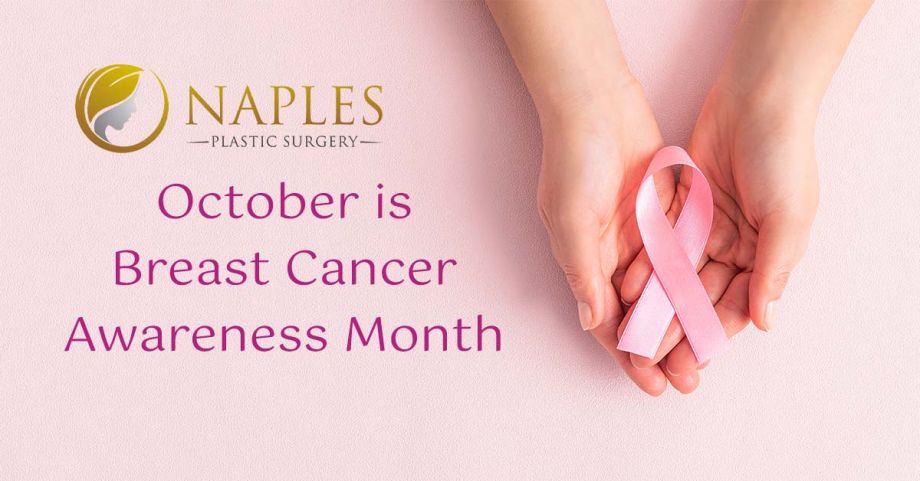
Educate Yourself During Breast Cancer Awareness Month
With first-hand experience helping survivors overcome the physical changes, and improve their self-esteem through breast reconstruction surgery, Naples Plastic Surgery is intimately familiar with breast cancer. Annually, October is Breast Cancer Awareness Month, we feel we should do our part to educate our patients and other readers about this disease that impacts one out of every eight women. Read on to learn more about breast cancer causes, risk factors, and other facts regarding the most commonly diagnosed cancer in women.
Breast cancer is caused by abnormal and uncontrolled cell growth that generally form into solid masses called tumors. Tumor cells that can grow into and interfere with adjacent tissue or spread to other parts of the body are considered “malignant,” and are cancerous. Tumors that do not invade nearby tissues or spread throughout the body are known as “benign,” and are not cancerous. Benign breast lumps in women are fairly common, but all suspicious growths in the breast area should be checked. Additionally, some types of breast cancer may not cause a lump in the breast. For this reason regularly scheduled mammograms are recommended, which are the best means for early detection of potential cancers at their earliest stages. The age at which you should start getting mammograms depends on several factors. A discussion with your primary care physician or general doctor is important to determine your individual indications.
Causes of Breast Cancer
Determining the exact cause of a woman’s specific breast cancer is nearly impossible, but damage to the cell’s DNA is the bottom-line cause. While this suggests a genetic influence passed down through heredity, researchers believe that less than 10 percent of breast cancers are directly caused by a genetic abnormality passed down through a parent’s genes. In most cases, researchers believe genetic abnormalities arise as part of the aging process and as a result of various environmental and lifestyle factors. Genetics, though, can influence the likelihood of DNA damage, and subsequent breast cancer formation.
Thus, there are both genetic and environmental risk factors at play with breast cancer; however, only about 65 percent of women who get breast cancer can be positively linked with these risk factors, while many women with these risk factors will remain breast cancer free.
Genetic Factors That Increase Breast Cancer Risk
- Being female—Women are 100 times more susceptible to breast cancer than men.
- Being white—Caucasian women are more predisposed to get breast cancer than women of all other races
- Close relatives who have been diagnosed with breast or ovarian cancer, especially if the diagnoses was made before age 50.
- Early (before age 12) menstruation and/or late (after 55) menopause.
- Never having a child, or bearing children late in the childbearing years.
- BRCA1 and BRCA2 genetic mutations (consider taking a genetic test if family history of breast cancer).
- Having dense breast tissue (which also makes it harder to detect possible breast lumps).
Environmental and Lifestyle Factors That Increase the Risk
- Poor diet lacking fruits and vegetables and high in saturated fats.
- Frequent or excess consumption of alcohol.
- Lack of physical activity and sedentary lifestyle.
- Being overweight or clinically obese.
- Previous radiation to the chest areas prior to the age of 30.
- Hormone replacement therapies for managing menopause.
Other Facts About Breast Cancer
- More than 250,000 U.S. women are diagnosed with breast cancer every year.
- Breast Cancer kills more than 40,000 American women per year.
- Second leading cause of cancer death in women.
- More than 3 million breast cancer survivors are alive in America today.
- While rare, about 2,500 American men are diagnosed with breast cancer per year, resulting in about 450 related deaths.
With these risks and facts about breast cancer in mind, we urge all women to take a proactive approach to their continued good health! Tell your doctor about any genetic risk factors you may be aware of, and consider whether you can mitigate possible environmental impacts. Also, be aware of the normal look, shape and feel of your breasts, and vigilant about seeing a doctor if you notice any changes. And, last, but not least, make sure you’re always scheduled for regularly scheduled screenings, such as physical exams and mammograms, appropriate for your age and risk profile.
Naples Plastic Surgery hopes that you will not have to undergo the trial of breast cancer treatment. However our surgical practice has extensive experience and has long offered breast reconstruction as part of its reconstructive surgery options. If you are facing a mastectomy or lumpectomy, learn how Naples Plastic Surgery can help you retain a positive body image with breast reconstruction surgery, by contacting our office today at 239.566.2611 to schedule your initial consultation.

